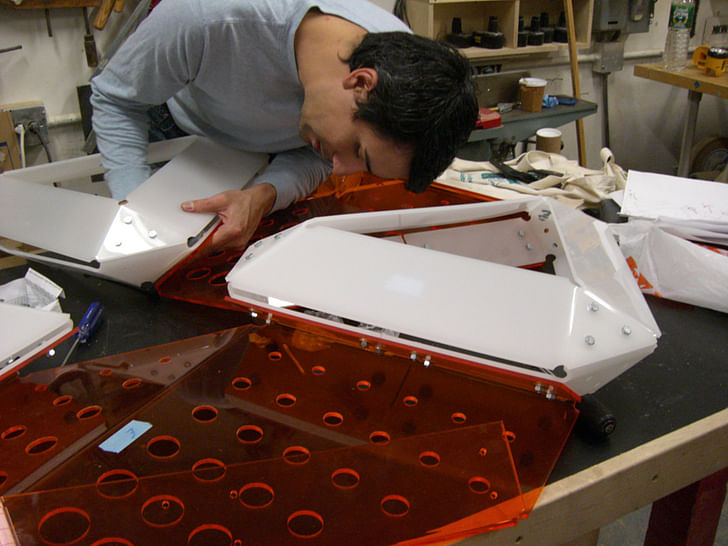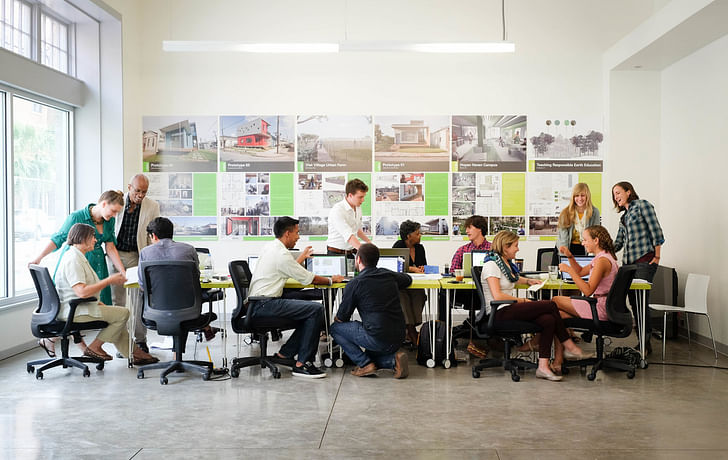

Anyway you slice it, the decision to go to architecture school is a big one—one of the biggest you may make. Architecture school is notorious for its grueling academic culture, so get used to sleeping under a desk. It’s also long (up to five years for a B.Arch, and two to 3.5 years for an M.Arch usually). Perhaps most importantly, today’s sky-high tuition usually necessitates taking on some debt, particularly if you’re studying in the United States. So is it worth it?
Archinect reached out to current architecture students and some recent graduates to solicit their advice to prospective students. What do they wish they had known before arriving to orientation? Would they do it all over again?

“Personally it had always been my plan to go to architecture school and I'm ultimately very glad I did,” states Emma Price, who graduated last year with an M.Arch from UCLA. “It was amazing to watch myself improve at something so rapidly in that kind of environment, and especially because I went to school in LA (and a small school at that) I have a fab network of working and academic connections in this city.”
It's the best. It's the worst. It's definitely not for everyone.“That being said, it's essentially a commitment to do ONLY architecture school for three years. Like, literally that is all you will do,” she continues. And that commitment comes with a cost: even with a fellowship, assistance from her grandmother, TA work, and savings, Price left school with about $40K in debt. Moreover, you probably won’t be paid more than $50-60K at your first job.
For a very-recent graduate, Price has gotten off to a good start: earlier this year she completed her first built project, the Eckhaus Latta store in Hollywood. In short, Price states she has “no regrets” about going to architecture school. “It’s the best,” she tells me. But also: “it’s the worst” and “it’s definitely not for everyone”.

Mark Bavoso, who is getting his B.Arch at Rice University, states, “The most significant challenge that I noticed early on in my education was that undergraduates often didn't really grasp the pedagogical goals or perspective of the school, and so became frustrated when their work was evaluated in terms they didn't understand or didn't want to engage.”
beyond rankings there is a huge difference between schools that gravitate towards different academic traditions“I was lucky that my choice of school turned out to be a program that suited my needs and interests,” he continues. “But in other cases I know students can feel stuck in a system they don't agree with. In my opinion, one of the most important factors for a successful and productive school experience is recognizing that beyond rankings there is a huge difference between schools that gravitate towards different academic traditions, design philosophies, and practical issues.”
To this end, Bavoso notes that while a school like Rice heavily emphasizes theory, other schools, such as SCI-Arc, might stress fabrication and technology. He’s found that school rankings tend to be based in traditionally “academic” terms—in other words, history and theory. “While you can make your education work for you no matter what you are interested in and no matter where you are,” Bavoso states, “it's helpful to get a sense of what your own values are and how you most enjoy working beforehand.”

If and when you arrive at architecture school, how you manage your time and energy is as important as where you are. While architecture school is notoriously difficult, burning the candle on both ends won’t help you out in the long run.
Productivity is more important than hours worked“Don't let architecture consume your 24 hours a day,” states Carly Augustine, who received her B.Arch from Syracuse University '12 and MArch II from GSD '15. “Productivity is more important than hours worked.”
“Create a schedule that works for you, which includes other activities, exercise and most importantly sleep,” she advises. “You are at your best when you are healthy, rested and happy. When you start to hit a wall, if you don't have a clear agenda or work plan, step away and refocus your thoughts. You can still dream about your project and fight through ideas as you are taking a jog, but it doesn't help staying up all night churning your wheels.”

Nels Long, who studied at SCI-Arc and now works with Michael Rotondi at RotoLab, has similarly pragmatic advice. “Balancing chemical intake is huge,” he tells me via Facebook. “What I’ve learned after graduating is that time is fluid—working 24 hours is the same as working 12 hours twice. Exercise and nutrition are important not only to your health but to creativity and productivity too.”
everyone wants good design, but no one wants to pay for it“When I say chemical I mean alcohol, caffeine, nicotine etc.” he clarifies (in case you were imagining the more illicit substances known to haunt the halls of architecture academia). “But I also mean building a reward system for yourself to allow/regulate willpower, stress, lactic acid, dopamine and serotonin as well.”
Other architects that I queried had advice—and warnings—more tailored to life after graduation. “I wish I had known that everyone wants good design, but no one wants to pay for it,” states Sofia Borges, a faculty member at USC. “That realization in itself would have probably propelled me into law school.”
“Oh and the secret to getting work is to not hang out with other architects!” she advises. “Go to pilates, the flea market—places where people who aren't broke frequent.”

An independent urban planner likewise offered a few select warnings: “The best way to study architecture is not the same as the best way to create good architecture. I realized this while still in school, resulting in poor relations with my teachers who were trying to set up the studio as a professional arch office with themselves as the boss.”
He felt this disconnect from quality extendsSociety doesn't value your skills. At all. from academia to the profession. “In the architecture industry, the people who hold the power are not interested in hiring good architects,” he contends. “They are interested in hiring obedient architects.”
Even worse: “Society doesn't value your skills. At all.” According to the urban planner, while the general public tends to understand and value jobs in the pharmaceutical industry or harder sciences, architecture “takes on a reputation of a cozy pastime that people hardly need to pay for, because all designers have so much fun at the job that their bills somehow evaporate into thin air.”

Meanwhile, a few current and prospective architecture students took my Facebook query of advice for prospective students as, perhaps, an opportunity to relieve some school-induced stress with a bit of humor (or perhaps seriousness).
“Borrow 100k, forget all that Marxist shit we learned in college, work for 30 years to pay it back,” said one.
“Don’t do it,” said another. “It’s a trap.”
This feature is part of September's Learning theme, which focuses on all things related to architectural pedagogy. For more, click here.
Writer and fake architect, among other feints. Principal at Adjustments Agency. Co-founder of Encyclopedia Inc. Get in touch: nicholas@archinect.com
6 Comments
Do undergrad in English, M.Arch... arch undergrad is waste of time
If you get out of arch school only 40k in debt you are one lucky bastard.
Where in the world is a fresh Archy grad pulling down $50-60k a year?
yeah right 50k - 60 k per year, some companies want us to intern without being paid for almost 2 years. After you learn about sustainability and importance of bylaws construction companies further ask you to violate those by biting into our consciences
“Society doesn't value your skills. At all.”
That's what happens when you don't value society's interests.
Architecture has no limit your mind will work wonders transpose into real world.
is that amazing? ... It pays of actually.. but you have to be a business man too.
Block this user
Are you sure you want to block this user and hide all related comments throughout the site?
Archinect
This is your first comment on Archinect. Your comment will be visible once approved.